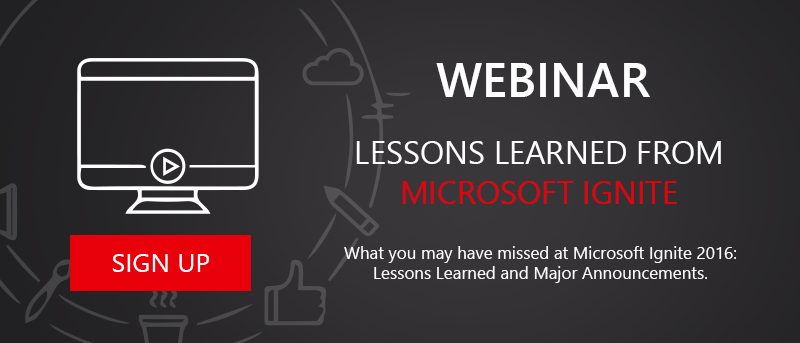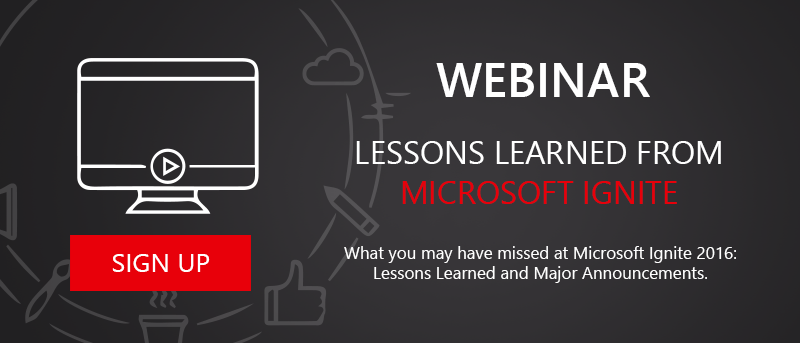Constellation Research’s Alan Lepofsky on How Microsoft AI Will Change the Way We Work [Video Interview]

In 1977 when Star Wars introduced the world to C-3PO and R2D2, artificial intelligence (AI) seemed as fantastical as that galaxy far, far away. But at Ignite this year when Satya Nadella, CEO of Microsoft, took to the keynote stage it was very clear that AI is right at our feet.
More importantly, Microsoft’s application of AI doesn’t look like just another robot. Instead, their vision for AI enhances the many tools we use already use at work and in our everyday lives!
At day two of the conference, I had the pleasure of talking with Alan Lepofsky, Principal Analyst of Collaboration Software at Constellation Research, who was even more excited than I was about the whole thing, Check out our interview to hear more about Microsoft’s new direction and what a future powered by AI tools might be like for people and businesses everywhere.
Discover Lessons Learned at Ignite 2016!

More from Dux Quax:
- Microsoft’s Julia White Talks Innovation and Transformation
- Microsoft’s Jeff Teper Rounds Up the Top 8 Innovations Added to SharePoint in 2016
- Microsoft’s Bill Baer Talks SharePoint Announcements at Microsoft Ignite
- Microsoft’s Chrisophe Fiessinger Shares the Elevator Pitch for Office 365 Groups
- Microsoft’s Mike McLean Gives the Scoop on Office 365 Planner
- Microsoft’s Rachel Braunstein Gives Insight into the Microsoft Partner Network
- Microsoft’s Jeremy Thake on Why Azure is More than Just Infrastructure as a Service
- NBCUniversal’s Charles Williams on Transforming a Deployment in the New Age of Microsoft
- Microsoft’s Dan Holme Shares Customer Feedback on SharePoint’s Comeback
- Microsoft’s Anna Chu Connects IT Pros Through the Microsoft Tech Community
- Constellation Research’s Alan Lepofsky on How Microsoft AI Will Change the Way We Work
- SharePoint Consultant Susan Hanley on Sustainable Adoption and the Future of Microsoft
Video Transcript: Dux Raymond Sy (@meetdux) and Alan Lepofsky (@alanlepo)
Dux: Hey everybody, this is Dux. Another episode of Dux Quax here at Microsoft Ignite 2016. End of day two, but it’s still hustling and bustling here in Atlanta. Alan, why don’t you introduce yourself?
Alan Lepofsky: Hey everybody, this is Alan Lepofsky from Constellation Research, and like you said, this is day two, so we’ve been going for 48 hours of sessions and keynotes and executive interviews and customers. And oh my God, this is quite a show.
Dux: So what’s the pulse so far from your perspective? What do you think of the event?
Alan Lepofsky: Well, this event last year was the first one of the Ignite shows and it was in Chicago. They brought it down here and I would say this one is an order of magnitude more energetic. Last year people weren’t quite sure what to do, it was a bunch of events brought together, and this year it’s definitely felt more cohesive. I’m talking to people out in the hallway that are like trying to figure out where they stand with their digital transformation. They’re kind of interested in the new products. They want some IT background, but they want some front-end products. What’s going on with Office 365, like all sorts of really good stuff.
Dux: So speaking more cohesive, do you think that has to do with the new Microsoft? What do you think of…because it seems like Microsoft is the cool kid on the block again, right?
Alan Lepofsky: It’s a great question. So to be clear to everybody, so I cover like collaboration tools, sort of the front-end stuff, and you used the phrase “new Microsoft,” which is so applicable to what I do. You ask an end-user what Microsoft is, and a few years ago it was Office. It was my Outlook, Word, PowerPoint, Excel.
Dux: Windows.
Alan Lepofsky: Windows. The new Microsoft has so dramatically changed. Now, whether it’s Cortana in Windows or even if it’s in the Office family. It’s Sway and things like Planner and things like GigJam.
Dux: On my iPhone.
Alan Lepofsky: Or your iPad. Steve Ballmer era, there was no iPad apps. So you could use your Microsoft products on so many different ways now. On bands and on surface hubs and all sorts of things. So as an analyst who covers collaboration tools, the ways and the possibility you use Microsoft have dramatically changed. Case in point, for example the new Microsoft partnering. In the last 24 hours, we’ve heard partnering with Adobe and partnering with Workday. Last year we heard partnering with Salesforce.
Dux: Red Hat.
Alan Lepofsky: Microsoft’s so much more open than they used to be and that’s a big change.
Dux: Here’s the funny thing, right? You talked about open and open source and all that. I think there was a recent article like on GitHub or something. Microsoft has the most open projects out there that people can use and take advantage of.
Alan Lepofsky: Well, since Microsoft Build, which was what? Four months ago or something, they announced yesterday that I think they said, 45,000 developers have already started using the cognitive services APIs that were announced to build. When you have 50,000 developers, now I don’t know, is every one of those active every day? I don’t know. It’s an impressive number for a short timeframe. So Microsoft…the new Microsoft is reaching a different audience, I think, and that’s pretty exciting.
Dux: Yeah, and especially like yesterday at the keynote, they talk about Azure being a supercomputing AI. That’s a bold claim.
Alan Lepofsky: Well, okay. That demo, mind-boggling. Again, as an analyst I have to put my hat on and go, “What’s the reality behind what they said?” But essentially the story they told, they could translate Wikipedia 6 billion words in 0.0198 seconds. So they said you blink in 0.2 of a second. In half the time it takes to blink, they can translate Wikipedia. Okay, that’s just mind-boggling. It’s how do you apply that computing power to our day-to-day lives, like image recognition and speech translation? And it’s going to be amazing.
Dux: I mean think about life-saving scenarios, doctors cranking through data and looking at them. You talk about insane mode, this is insane mode right here.
Alan Lepofsky: Yeah. You guys, security, compliance, administration.
Dux: Absolutely.

Alan Lepofsky: Threat detection in tenths, hundredths, thousandths of a second instead of two or three hours later.
Dux: Exactly, which is too late.
Alan Lepofsky: Oh by the way, someone already robbed you.
Dux: Exactly yeah. No, this is…even for me as a partner and working with customers, there’s this new energy and you talk about digital transformation is, customers are getting it now, and even the cloud, right? Back then people think about the cloud, “Oh, I just need to move my data center from point A to the cloud.” That’s…but it’s still data center mindset, IS. But all these advanced workloads, forget moving your VMs. There’s no way you could do it on-prem, but think about the business impact you can deliver.
Alan Lepofsky: Well, like they said, a lot of these new features, a lot of the new tools, while Microsoft is still supporting on-premises software, the new stuff, the new features, the AI, that all happens in the cloud. You’re not…everybody’s not going to have their own infrastructure that has all of the data that Bings or that Graph has or something. So to be able to process all this artificial intelligence, to add assistance to the thing…creating a PowerPoint presentation. They showed a demo yesterday where instead of starting with a blank page, you type in the topic.
You say, “I want to write about electric cars.” PowerPoint created for them an outline. You probably want slide one to be history. Slide two, to be pricing. Slide three, and then you can fix it, but it created an outline. I don’t know about you, but I’ve never had my software do the work for me.
Dux: I mean you’re an analyst, you write all the time. Wouldn’t that be great?
Alan Lepofsky: I want to work like two days a week and have the tools do that.
Dux: Write your blog, write your white paper.
Alan Lepofsky: Yeah, and this is the theme. It’s not just coming from Microsoft. The whole industry is sort of looking at where does artificial intelligence play a role in both personal productivity, so individuals, and team collaboration. So we’re seeing things from Oracle, we’re seeing things from IBM, we’re seeing things from Microsoft, we’re saving some Salesforce. So I’m excited because this is the first generation of software that isn’t just like something simple, like I move to the cloud or I move to mobile. This is a paradigm shift. It’s software that will help you do your job. That’s really cool.
Dux: Well, I mean think about our kids, right? Fast forward 5, 10, 20 years from now. What would that look like?
Alan Lepofsky: Yeah, they’re not going to know blank template.
Dux: No, it’s just done, right?
Alan Lepofsky: Not at all. Yeah.
Dux: Awesome. Well Alan, before I let you go, if you were a Microsoft product, what would you be and why?
Alan Lepofsky: I have to think through the portfolio. I would be…I’d start as Clippy. I’d be the annoying little guy that bothers everybody with lots of details and then I’d evolve myself…I like the new stuff. I like Planner. Planner is all about organizing, but it’s sort of social and ad-hoc. It’s not as organize or detail this project. So I’d say I’m Planner.
Dux: You’re Planner or even Agile, right?
Alan Lepofsky: I hadn’t thought about that, now I’m going to have to get a new t-shirt or something.
Dux: There you go.
Alan Lepofsky: What would you be? Can I turn it around on you?
Dux: That’s a good one. You know what, I want to be Notepad. To this day, I still use Notepad.
Alan Lepofsky: Is that your favorite tool?
Dux: It is. It’s simple, it’s easy, it’s pure, I’m a purist, but Notepad is my favorite.
Alan Lepofsky: All right, there you go. You’re a classic.
Dux: That’s right.
Alan Lepofsky: Nice.
Dux: I’m an old soul.
Alan Lepofsky: All right. Everybody out there that’s watching, tweet to Dux what Microsoft product you would be. I want to see these responses.
Dux: Yeah, maybe we should start running a survey, right?
Alan Lepofsky: What’s a good hashtag?
Dux: What would you be or whatever. We’ll figure it out.
Alan Lepofsky: We’ll figure it out.
Dux: If I was a Microsoft product…
Alan Lepofsky: Everybody knows Dux on Twitter. I’m Alan Lepo. A-L-A-N L-E-P-O. Tweet to us what Microsoft product.
Dux: Make sure…we’ll make sure his handle is there, but other than that, thank you sir. Enjoy the rest of the conference.
Alan Lepofsky: Thank you.
Dux: Thank you for watching. Until the next episode, bye.
What else did you miss at Ignite?
Watch our Lessons Learned at Microsoft Ignite webinar, now on-demand for a recap of announcements from the conference and a deeper discussion about what it all means for you.

With over 20 years of business and technology experience, Dux has driven organizational transformations worldwide with his ability to simplify complex ideas and deliver relevant solutions. He serves as the Chief Brand Officer of AvePoint who has authored the LinkedIn Learning course How to Build Your Personal Brand, the book SharePoint for Project Management, as well as numerous whitepapers and articles. As a public speaker, Dux has delivered engaging, interactive presentations to more than 25,000 people at leading industry events around the world. He also hosts the modern workplace podcast #shifthappens that focuses on how leading organizations navigated their business transformation journey. Dux advocates tirelessly for inclusion, using technology for good, and philanthropic initiatives. Connect with him: http://dux.sy



